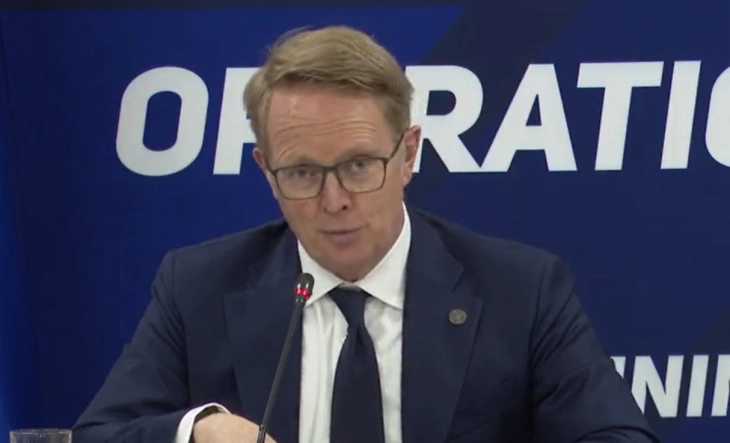Leijtens: FRONTEX to ensure greater efficiency in tackling migration routes and crime
- The FRONTEX forces will be present thus ensuring more quality and more security of borders, and I am convinced that this will help in combating crime and those who need our help. The cooperation is an excellent example of how FRONTEX wants to cooperate with third countries, with you and with the other countries that bear the burden of the migrant routes, Frontex Executive Director Hans Leijtens said at the joint press conference with Interior Minister Oliver Spasovski on official launch of the Frontex joint operation in North Macedonia.

Skopje, 20 April 2023 (MIA) - The FRONTEX forces will be present thus ensuring more quality and more security of borders, and I am convinced that this will help in combating crime and those who need our help. The cooperation is an excellent example of how FRONTEX wants to cooperate with third countries, with you and with the other countries that bear the burden of the migrant routes, Frontex Executive Director Hans Leijtens said at the joint press conference with Interior Minister Oliver Spasovski on official launch of the Frontex joint operation in North Macedonia.
As asked by a reporter if the presence of FRONTEX officials could make the Balkan route unattractive, Leijtens said that it is not only a matter of combating migrant routes, but also of combating crime.
“Migrant smuggling is one of the worst crimes we can face. You can only imagine what that means and that is why it is important to take the next step in the Western Balkans and I must say that this is an important step for the Government of North Macedonia, because they are open to this cooperation, they want our help, and we are pleased to be able to help them. At the same time, we will learn from your police officers because we want to know the characteristics of the Western Balkans migrant routes and that is precisely why joint operations and activity are needed not only with North Macedonia, but also with the rest of the Western Balkan countries. I am confident that we will succeed. But this is a marathon, not a fast run, not a sprint,” Leijtens said.
Regarding whether they have specific goals that they want to achieve during the mission and what will depend on whether the Agreement will continue after January 2024, he said that their commitment does not end in January 2024, but, as he said, FRONTEX does an evaluation on an annual basis, so maybe there will be an extension and it will be here longer.
“In our profession it is very difficult to give concrete and precise results because of course the criteria are part of a larger set. As mentioned during the launch event, we are also dealing with climate change, with geopolitical challenges, there is also the war in Ukraine, and because of that I cannot give you a number like a thousand, zero or whatever. Therefore, a constant dialogue between the Government of North Macedonia and our Agency is needed. What we've been doing now, what we're still doing is sharing information about what we know, and now we're in a position to see the European picture. For now it is the Eastern Mediterranean area, but things change from today to tomorrow and that's why we often contact both from the point of view of FRONTEX and from the point of view of North Macedonia to see the whole picture, to have a broader picture of what is happening in the region of the Mediterranean Sea,” Leijtens said.
According to him, the results cannot be achieved overnight and that is why their engagement is until January 2024, but he reiterated, their commitments do not stop there.
“We are constantly informing ourselves and deciding how to proceed further. Of course, the focus of FRONTEX will depend on a specific situation. And it is very important to rely on the information we receive from our colleagues from North Macedonia. Of course, we look at the daily operations, we follow the trends and at the moment as we said the central and eastern Mediterranean is our biggest concern right now,” he said.
Photo: print screen







